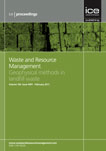
Proceedings of the Institution of Civil Engineers-Waste and Resource Management
Scope & Guideline
Pioneering Strategies for Effective Resource Optimization
Introduction
Aims and Scopes
- Sustainable Waste Management Practices:
The journal emphasizes research on sustainable waste management strategies, including recycling, recovery, and proper disposal methods, to minimize environmental impact. - Innovative Material Utilization:
There is a strong focus on exploring the use of waste materials as alternative resources in construction and other sectors, showcasing how waste can be transformed into valuable materials. - Impact Assessment and Policy Analysis:
Research often includes assessing the environmental impacts of waste management practices and analyzing policies that govern waste management and resource recovery. - Technological Advancements in Waste Management:
The journal publishes studies on technological innovations, such as intelligent waste sorting systems and bioenergy production, aimed at improving efficiency in waste management. - Community Engagement and Societal Impacts:
It addresses the social dimensions of waste management, including community involvement and the role of local authorities in shaping effective waste management strategies.
Trending and Emerging
- Circular Economy Initiatives:
A growing interest in circular economy principles is evident, with research exploring how to close the loop on resource use, reduce waste, and enhance material recovery. - Use of Advanced Technologies:
Emerging themes include the application of advanced technologies such as machine learning and data-driven modeling in waste management processes, highlighting the integration of digital tools in the field. - Waste-to-Energy Solutions:
There is an increasing focus on waste-to-energy technologies, showcasing innovative methods for converting waste into usable energy, which aligns with global sustainability goals. - Community-driven Waste Management:
Research is increasingly addressing the role of community engagement in waste management, emphasizing participatory approaches and local solutions to waste issues. - Environmental Impact and Life Cycle Assessment (LCA):
There is a noticeable trend towards incorporating environmental impact assessments and LCAs in waste management studies, providing a comprehensive understanding of the ecological footprint of different practices.
Declining or Waning
- Traditional Waste Disposal Methods:
Research focusing on conventional landfill practices and incineration has decreased as attention shifts towards more sustainable and innovative waste management solutions. - General Waste Characterization Studies:
There has been a decline in studies that simply characterize waste types without exploring innovative management strategies or applications, as the field moves towards more applied research. - Focus on Single Waste Streams:
The emphasis on single waste streams, such as only municipal solid waste or construction waste, is waning in favor of integrated approaches that consider multiple waste types and their interactions.
Similar Journals

Resources Conservation & Recycling Advances
Driving impactful discussions in environmental science.Welcome to Resources Conservation & Recycling Advances, an influential open-access journal published by Elsevier since its inception in 2021. With an ISSN of 2667-3789, this journal serves as a vital platform for disseminating cutting-edge research in the fields of economics, waste management, and environmental science. Recognized for its high impact, it proudly holds a Q1 ranking in both Economics and Econometrics as well as Waste Management and Disposal, highlighting its significance within these critical categories. The journal aims to advance understanding and innovation in resource conservation and recycling practices, making it an essential resource for researchers, professionals, and students dedicated to sustainability. With its current Scopus rankings placing it in the top percentiles—34th out of 716 in Economics and Econometrics and 21st out of 134 in Waste Management—Resources Conservation & Recycling Advances continues to contribute to meaningful discussions and developments in the pursuit of a more sustainable future.
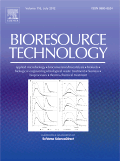
BIORESOURCE TECHNOLOGY
Transforming Challenges into Opportunities in Environmental EngineeringBioresource Technology, published by Elsevier Science Ltd, is a leading journal in the fields of bioengineering, environmental engineering, and sustainable resource management. With an impressive impact factor reflected in its Q1 rankings for 2023 across multiple relevant categories, it stands out as a premier source for groundbreaking research from its inception in 1991 to its anticipated contributions through 2024. Bioresource Technology promotes the advancement of technologies and methodologies aimed at the sustainable utilization of biological resources, playing a pivotal role in tackling the challenges of waste management, renewable energy, and environmental protection. Researchers and practitioners are encouraged to contribute and engage with high-quality studies that have significant implications for the global push towards sustainability and innovation. Although the journal does not currently offer Open Access, its subscription model ensures that the rigorous peer-reviewed content remains accessible to those dedicated to advancing the field.

Journal of the Southern African Institute of Mining and Metallurgy
Elevating Standards in Mining and Metallurgy.The Journal of the Southern African Institute of Mining and Metallurgy (ISSN: 2225-6253; E-ISSN: 2411-9717), published by the Southern African Institute of Mining and Metallurgy, stands as a pivotal resource in the fields of mining and metallurgy, with a particular focus on geotechnical engineering and materials chemistry. Since its inception in 1969, this Open Access journal has aimed to disseminate high-quality research that addresses pressing challenges and innovations within these industries. With its categorization in the Q3 quartile for 2023 across multiple disciplines, including Geotechnical Engineering, Materials Chemistry, and Metals and Alloys, the journal has established a notable presence in the academic community. Researchers and practitioners can explore a wide array of studies and insights, enhancing their understanding of new methodologies and advancements. Based in South Africa, this journal not only reflects regional developments but also connects with global trends, making it an essential platform for knowledge exchange among researchers, professionals, and students eager to contribute to the advancement of mining and metallurgical sciences.
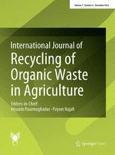
International Journal Of Recycling of Organic Waste in Agriculture
Fostering Sustainable Agriculture through Innovative RecyclingInternational Journal of Recycling of Organic Waste in Agriculture is a pioneering open-access journal, established in 2012 and published by the Islamic Azad University, Isfahan-Khorasgan Branch, Iran. With ISSN 2195-3228 and E-ISSN 2251-7715, this journal focuses on innovative research and development in the field of organic waste recycling within agricultural contexts. As indicated by its latest metrics, it holds a respectable ranking in the Q2 quartile in Agricultural and Biological Sciences and Q3 in Waste Management and Disposal for 2023. This positions the journal as a valuable resource for professionals, researchers, and students invested in sustainable agricultural practices and waste management strategies. With its commitment to advancing knowledge and fostering interdisciplinary dialogue, the journal serves as an essential platform for disseminating significant findings that can positively impact environmental sustainability and agricultural productivity worldwide.
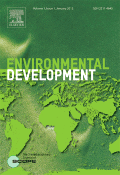
Environmental Development
Leading the charge in transformative environmental research.Environmental Development is a premier academic journal published by Elsevier, dedicated to advancing the field of environmental science through interdisciplinary research and innovative practices. With a focus on geography, planning, and development, as well as management, monitoring, policy, and law, this journal provides a rigorous platform for scholars and practitioners to share insights that shape sustainable environmental policy and practice. Holding a prestigious Q1 ranking in both relevant categories and boasting impressive Scopus rankings - 62 out of 821 in Geography and 60 out of 399 in Environmental Science - Environmental Development stands out as a critical resource for those invested in the future of our planet. The journal emphasizes impactful research that addresses contemporary challenges, fostering dialogue across disciplines and geographical boundaries. With a commitment to high-quality research, it offers an important outlet for those aiming to influence environmental policy and developmental strategies globally. Join the growing community of researchers, professionals, and students engaged in promoting sustainable environmental practices through the knowledge shared in this esteemed publication.
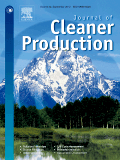
Journal of Cleaner Production
Pioneering Research in Environmental SustainabilityThe Journal of Cleaner Production, published by Elsevier Science Ltd, is a leading interdisciplinary journal dedicated to the development and dissemination of knowledge on environmental sustainability and cleaner production practices. With an impact factor that reflects its high relevance in the field, the journal is recognized as a Q1 publication in key categories including Environmental Science, Industrial and Manufacturing Engineering, Renewable Energy, and Strategy and Management as of 2023. This prestigious journal has been a platform for groundbreaking research since its inception in 1993 and continues to shape the dialogue around sustainable practices in various sectors. Researchers and professionals across disciplines can access its wealth of insights, which are critical for driving the transition towards more sustainable production and consumption models. The journal’s rigorous peer-review process ensures that only high-quality research is published, making it an essential resource for academics, industry leaders, and policymakers committed to advancing cleaner production methodologies.
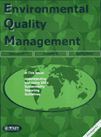
ENVIRONMENTAL QUALITY MANAGEMENT
Bridging Disciplines for Enhanced Environmental QualityENVIRONMENTAL QUALITY MANAGEMENT is a respected journal published by WILEY, focusing on interdisciplinary studies that merge environmental science with public health, management, policy, and law. Since its inception in 1991, this journal has provided a platform for researchers and practitioners to share innovative insights and advancements in understanding environmental quality and its impacts on human health and the ecosystem. With an ISSN of 1088-1913 and an E-ISSN of 1520-6483, it holds a significant position in the academic community, evidenced by its presence in the Q3 quartile across several categories, including Management, Monitoring, Policy and Law, as well as Pollution and Waste Management. Although it is not an open-access journal, it continues to be a vital resource for those in the environmental sector, offering robust evaluations and discussions that advance knowledge and foster improved practices. With Scopus rankings demonstrating its relevance among other titles in the field, ENVIRONMENTAL QUALITY MANAGEMENT plays a crucial role in shaping discourse and informing policy in an increasingly vital area of study.

Detritus
Fostering collaboration for a greener tomorrow.Detritus, an esteemed open-access journal published by CISA PUBLISHER since 2018, serves as a vital platform for the dissemination of innovative research in the fields of Environmental Chemistry, Environmental Engineering, and Waste Management and Disposal. Based in Padova, Italy, the journal aims to foster scholarly communication and collaboration among researchers, professionals, and students dedicated to advancing our understanding of environmental challenges and solutions. With its open-access model, Detritus ensures that high-quality research is freely available, bridging the information gap within the scientific community. While currently categorized in the Q3 quartile across multiple environmental science disciplines, the journal is poised to further enhance its visibility and impact, contributing significantly to pressing global issues such as waste reduction and sustainable resource management. As the journal continues to evolve, it encourages submissions that advance theory and application in these critical areas.

Journal of Hazardous Materials Advances
Elevating standards in environmental health and safety.The Journal of Hazardous Materials Advances, published by ELSEVIER, is a premier open-access journal dedicated to advancing the understanding and management of hazardous materials. Established in 2021, this journal has quickly gained recognition, securing a place in the prestigious Q1 quartile across multiple categories, including Environmental Chemistry, Environmental Engineering, Health, Toxicology and Mutagenesis, Pollution, and Waste Management and Disposal. With its impactful research indexed under ISSN 2772-4166, the journal not only prioritizes quality but also promotes accessibility to its scholarly outputs, ensuring that vital findings are readily available to the global research community. As part of Scopus, the Journal ranks competitively in various subfields of Environmental Science, reflecting its vital role in addressing contemporary environmental challenges. Researchers, professionals, and students can rely on this journal to provide innovative insights and solutions in the ever-evolving landscape of hazardous material management and its implications for public health and environmental sustainability.
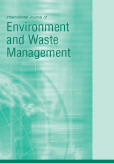
International Journal of Environment and Waste Management
Advancing Practices for a Cleaner PlanetThe International Journal of Environment and Waste Management, published by InderScience Enterprises Ltd, serves as a vital platform for researchers and professionals in the fields of Environmental Engineering and Waste Management. With an ISSN of 1478-9876 and an E-ISSN of 1478-9868, this journal encompasses a wide range of topics from innovative technologies in waste processing to sustainable environmental practices. Ranked in the Q3 category for Environmental Engineering and Q4 for Waste Management and Disposal in 2023, it holds significance in advancing knowledge and impacting practices in these essential domains. The journal accepts articles that contribute to the understanding and development of effective waste management strategies, ensuring alignment with contemporary environmental challenges. As it converges years from 2006 to 2024, it continues to attract contributions that reflect the latest research and methodologies. For scholars, students, and practitioners alike, this journal is an invaluable resource, enriching the dialogue around environmental sustainability and waste minimization.